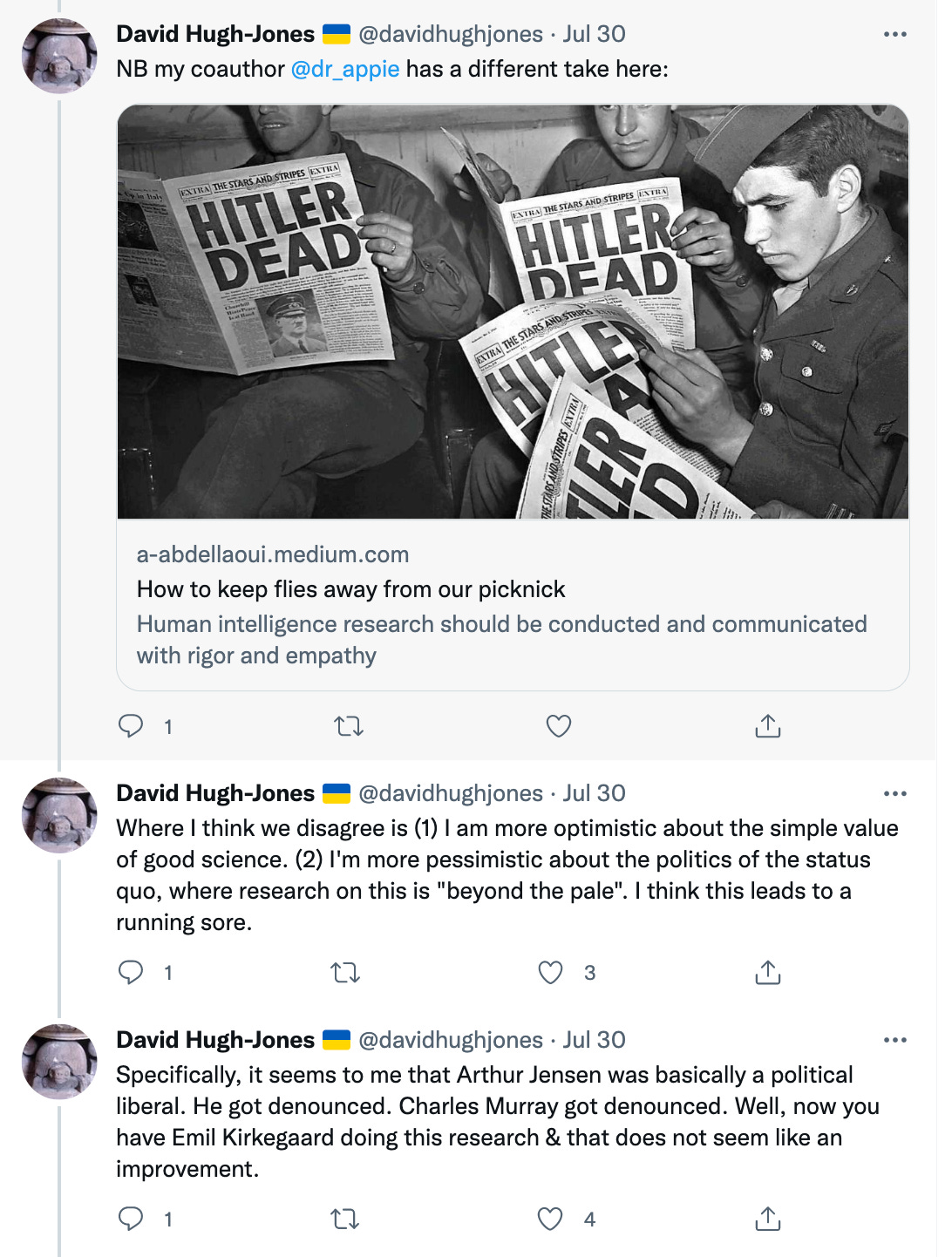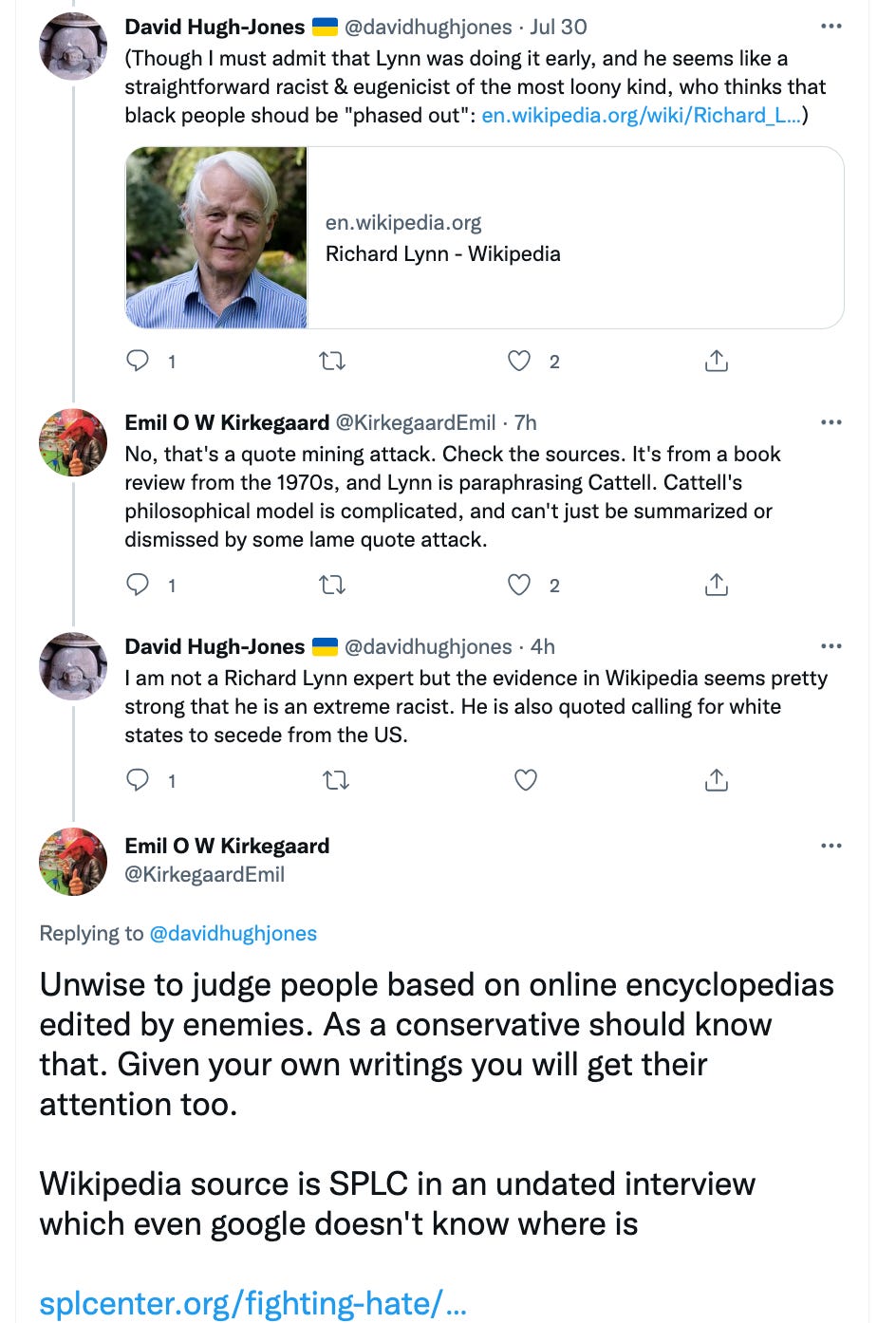Written by Matthew Archer.
The beginning of thought is in disagreement – not only with others but also with ourselves.
– Eric Hoffer
You probe with bayonets: if you find mush, you push. If you find steel, you withdraw.
— Vladimir Lenin
The social scientist David Hugh-Jones recently Tweeted a thread summarising his latest Substack on whether we should research race differences in important traits. His answer is a resounding yes, but with the usual caveats around acknowledging the socially sensitive nature of the topic. He has more to say about why we should do such research, which you can read here:
Hugh-Jones acknowledges in his Tweet thread that other leading researchers disagree with him, most notably Abdel Abdellaoui. He then takes aim at the descent from liberal intelligence researchers (Jensen), to conservative (Murray), to what he presumably views as racist/racism adjacent researchers like Emil Kirkegaard:
Hugh-Jones links to Abdellaoui’s recent Medium article, where discusses his decision not to give a talk at this year’s ISIR conference (International Society for Intelligence Research) because Kirkegaard was also scheduled to give a talk. ISIR then cancelled Kirkegaard’s talk causing Abdellaoui to decide he was able to speak. Abdellaoui ended up giving a poorly received lecture replete with virtue signalling. For a good write up of this odd affair, see Noah Carl’s Substack.
It’s also instructive to note that in the Abdellaoui article Hugh-Jones links to, Abdellaoui cites the website RationalWiki to evidence why Kirkegaard is such an odious character. This radical left website exploits its unreasonably high Google ranking to slander anybody who researches controversial issues and gets the “wrong” answers. Despite the obviously polemical nature of the biographies character assassinations, people seem to take the website seriously. When I spoke to Bo Winegard on the podcast, he detailed how the website played a crucial role in his cancellation. You can listen to that here:
The Rat Wiki editors know this, of course. They relish in the bizarre efficacy of combining readers’ confirmation bias with the word “Wiki” — which boomers and the naive must associate with legitimacy. Here’s a relevant section from Bo Winegard’s response to learning about the creation of his own Rat Wiki page:
My page then claims: “Winegard supports “ethno-traditionalism”, which is more or less white nationalism repackaged and relabelled, so he can simultaneously defend white nationalists, while denying accusations of racism. Clever guy.”
This is mendacious because “ethno-traditionalism” is absolutely not “white nationalism” relabeled. Here, for example, is an article by Eric Kaufmann that covers this in detail.
And I support cultural nationalism anyway, which is, I think, a more appropriate term for the kind of vision I have about the virtues of national identity. Also, I have never defended white nationalism qua white nationalism — in fact, I have argued against it on a number of occasions.
Now I believe (perhaps I’m wrong) that ideally fellow scientists wouldn’t care much, if at all, about the political views of their fellow researchers. However, if Hugh-Jones or anybody else is interested, Kirkegaard has thoroughly detailed his political views in a response to Abdellaoui:
After suggesting Kirkegaard shouldn’t be the one doing such controversial research (presumably because Hugh-Jones thinks he doesn’t act in a mature enough manner on Twitter?), he points out that Richard Lynn has been doing the same research for a lot longer and apparently has far worse political views. An exchange between the two then ensues:
Kirkegaard is clearly correct here. One simply cannot expect extremely sensitive topics to be given a fair hearing on Wikipedia anymore. This was probably always the case, but has ramped up in recent years, as Kirkegaard himself has detailed (see below). Indeed, even Wikipedia’s co-founder says he no longer trusts the website.
I also find it odd that a senior academic (Hugh-Jones) wouldn’t check the source of the quotes attributed to Lynn, as Kirkegaard suggested. Having read Lynn’s memoir and interviewed him several times now (coming out soon), I find it extremely hard to believe he is a racist “of the most loony kind”. He’s a 92 year-old highly cited academic who has lived through not only sweeping demographic change, but an establishment that explicitly called for such change and then labelled anybody opposed to it as racist or, worse, gaslighted them as conspiracy theorists.
If we are to care about researchers’ political views, we should at least try to put the best version of those views forward, a practice known as steelmanning. Given the immense “whiteshift” (to quote Eric Kaufmann’s book) that has taken place and will continue to accelerate, it might be fairer to read Lynn’s comments about US state secession in a different light. Calling for such secession might be naive (or even a tongue-in-cheek joke), but is it really “strong evidence” of “extreme” racism, to quote Hugh-Jones? Lynn’s comments sound a lot closer to the ethno-traditionalism Winegard and Kauffman speak about.
Regardless, most researchers will never rise to either the disinterested autist or steelman standard of science and engagement. And to be fair, their career, reputation, and finances ofter ample reasons not to. We cannot expect a damascene conversion when the balance sheet is so heavily tilted. This reluctance to engage is most unfortunate because it creates a kind of self-fulfilling prophecy.
Indeed, a leading geneticist recently wrote an article for the guest section of this blog, Ideas Loading. This is a scholar with a good H-index who has a lot of subtle stuff to say about using polygenic scores for embryo selection. Though they were broadly in favour of the practice, the piece added some wonderful nuance to the debate. But the scholar decided they couldn’t publish it on my Substack, partly because they wanted to syndicate it more widely, but also because, in their own words:
I now see in the website content related to genetic differences between populations on IQ etc. While I fully support academic freedom to study this subject, I nevertheless don't feel comfortable to be associated with this content. I again apologize and I'm so so sorry for your time. I hope this is understandable.
To which I asked:
Not a problem. What is the piece on the website that made you feel uncomfortable?
Their reply:
Thanks for the understanding. I was mostly troubled by the interview with Emil Kirkegaard, but also with Bo Winegard. Again I support academic freedom to study any subject, but studies on sensitive subjects must be performed extraordinarily carefully and sensitively, with very close attention to confounders and other caveats, and to the way the public may perceive the results. I don't want to enter a discussion over specific papers or ideas, but the researchers above are not associated with these values in my mind and in the minds of many of my colleagues. This is an excellent recent text very much related to the above, from an excellent scientist who is not afraid of difficult subjects.
Note that the piece this researcher links to is again the Medium article from Abdellaoui that cites RationalWiki. I responded:
I respect your stance here, but I really think you ought to reconsider. Here's why:
I actually reached out to Abdel. Multiple times in fact. I heard nothing back. I'm interested in a proper debate, not just researchers existing in ideological silos refusing to speak to one another or to be seen in the same virtual space. By not contributing counter-pieces, this problem only gets worse, of course.
I've linked Noah Carl's latest piece on the Abdel-Kirkegaard affair. I urge you to read it. If we truly believe in the values of science, then isn't it incumbent upon people to make a scientific reply, not ad hominem? I would have loved to discuss this with Abdel, but obviously he didn't feel the same way.
I agree with you about presenting research carefully. I think your article does a very good job of that and would be nice counterbalance. Of course, if you agree with this but still do not wish to publish because of your first reason, that's fine.
Regardless, I'd be very interested to hear your take on Noah's piece.
Their final reply:
Well regarding Noah Carl's blog - the only point I agree with is that using "credentialism" by Abdel was misplaced. But I did read one of Kierkegaard's genetics papers, and I do understand very well the technical problems in this area (having done similar work myself), and what he and his colleagues are doing is junk science. Now there are a lot of people out there doing junk science, but Kierkegaad et al also use it to spread hate and a lot of it (I didn't investigate this, but I take the word of colleagues, and I don't think this is disputed). In combination, this is too much for me and I think it would be justified not to want to associate with him. I'm happy to debate and argue with many people, and I try very very strongly to avoid ad hominem arguments, but there are red lines. By the way note that Abdel does explain in his blogpost the scientific reasoning why Kierkegaard et al's research on IQ is junk.
I reached out to Kirkegaard for a response to the junk science accusation. He replied:
There's no substantial attack on my research anywhere as far as I know. There's one preprint that attacks the Jewish polygenic scores paper but it is now moot because they have been replicated in three other samples.
I should say that David Hugh-Jones is due to come on the podcast to talk about his latest research, a fascinating dysgenics article on Britons that made it into the Telegraph. (Actually, the kicker here is that Abdellaoui is the lead author on that article, hence speculation that his decision to attack Kirkegaard was a lame attempt at holding off the baying mob who know exactly who he is.) However, perhaps David and I can also discuss the state of controversial science, too, including everything above. If you’re reading this David, I hope you still want to come on!
And this is the point, because if nobody who (ostensibly) disagrees with the likes of Kirkegaard, Lynn, Winegard, even wants to disagree on the same blog, it makes the problem they (ostensibly) disagree with worse. This is how echo chambers are constructed. So how about we stop citing Wikipedia and (God forbid) RatWiki and actually talk?
Matthew Archer is the Editor-in-Chief of Aporia.
Consider supporting us with a $6.99 monthly subscription and following us on Twitter.




















There's something rotten in the state of science